Putting heart into a career of transplantation

“I can remember feeling concerned about it, as it was still an experimental form of treatment,” Dr. Neil McKenzie said, reflecting on the first heart transplant he ever performed. “In truth, I admired the patient who submitted to the procedure, knowing very well they may or may not survive.”
The patient did survive, making Dr. McKenzie the first surgeon to perform a successful heart transplant in Canada with the use of cyclosporine — a medication used to prevent rejection in patients who have received kidney, liver and heart transplants.
That successful transplant would be the first of many in Dr. McKenzie’s impactful career, which, so far, has spanned over four decades.
Dr. McKenzie grew up in Aberdeen, Scotland, where he received his medical degree at the University of Aberdeen in 1968. Upon graduation, he completed a British Heart Foundation research fellowship in Sweden, followed by his general surgical training.
In 1974, Dr. McKenzie made the decision to move to London, Ontario, where he became a senior resident in cardiovascular and thoracic surgery at University Hospital. In addition to his keen interest in the circulatory system, Dr. McKenzie credits his move to the Hospital’s research background, innovative spirit and small team of young professionals.
“Initially I was only going to be in Canada for a year or two of training, but I found myself really enjoying the time I spent at work. I decided to stay a little bit longer, and a little bit longer after that, and eventually just never left,” he said with a laugh. “I’ve been here ever since.”
Between the years of 1976 and 1997, Dr. McKenzie took on a variety of roles, including Chief of the Cardiovascular and Thoracic Surgery Division at University Hospital and Chairman of the Division of Cardiovascular and Thoracic Surgery at Western University. He is currently Staff Surgeon and Cardiac Surgeon for London Health Sciences Centre, and Professor in the Department of Surgery at Schulich Medicine & Dentistry.
Dr. McKenzie was recently awarded the Dean’s Lifetime Achievement Award by Dr. Michael J. Strong, dean, at the 2015 Celebration of Excellence event on May 20. Before Dr. McKenzie received a standing ovation from the audience for this accomplishment, Dr. Strong commended him for his commitment to the field, and his kindness, good humour and modesty, which serves as an example for all.
“I simply thought they just give the Lifetime Acheivement Award to people who live long enough,” he said with a laugh. “It truly was an honour to receive the recognition, but I’m only one part of quite a large team of people who’ve contributed here. My own success is divided amongst many others.”
While some of his success has been a group effort, Dr. McKenzie has undoubtedly made an impact on his own as well. Since completing that first heart transplant in 1981, he has treated thousands of patients with the highest level of skill and compassion. At one point, he was the only surgeon doing thoracic and blood vessel surgery at University Hospital.
He has also contributed to hundreds of publications, chapters, articles and presentations.
Dr. McKenzie explained throughout his career he has felt grateful to have had the opportunity to do so much for his patients — a pleasure that has continued to persist until this day. While he is still actively doing surgery, his responsibility is mostly in the form of teaching residents and supporting research activities.
“Teaching is very rewarding, because you end up meeting your students years later and seeing all they have accomplished,” he said. “It’s good to work with these people. They keep you young, active and grounded.”
As much as Dr. McKenzie has taken from his students, he has given back to them in guidance and advice. His own career has proven that there is no substitute for hard work and attention to detail — something he continues to pass on to the next generation of surgeons.
“There are some people for whom surgery would not be a good career, and I think those people have to recognize that within themselves, rather than force themselves into a path that is not good for them,” he said. “But if they enjoy it and have a natural aptitude for it, I say go for it. Why not?”








